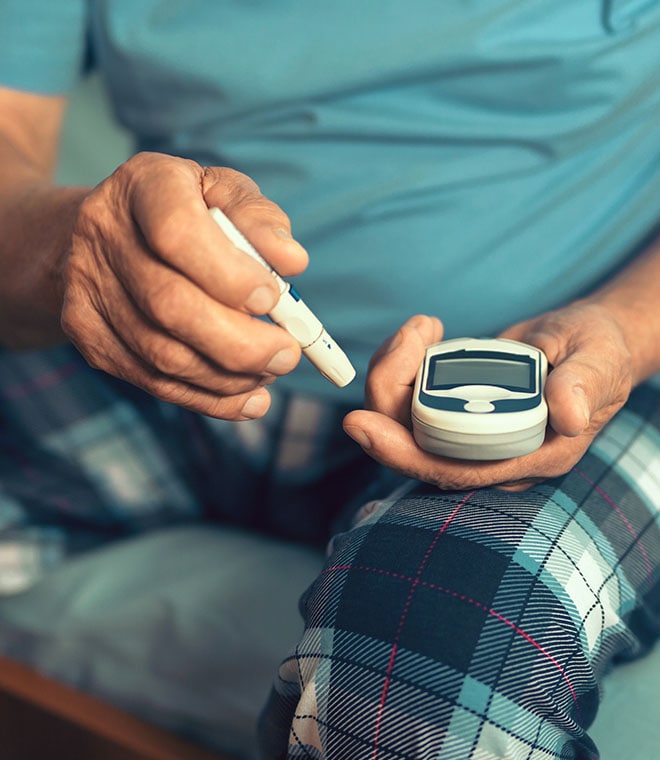Health
Hypoglycemia (low blood sugar) in diabetes
By Jenilee Matz, MPH Oct 25, 2023 • 9 min
Even though diabetes is known for causing high blood sugar, hypoglycemia (low blood sugar) can also be a concern. Low blood sugar occurs when the level of sugar (glucose) in your blood drops below what the body needs to function normally. Low blood sugar is serious and requires prompt treatment. Find out why low blood sugar levels happen and how to treat and prevent them.
Low blood sugar basics
For many people with diabetes, low blood sugar is considered 70 mg/dL or less. However, your healthcare provider may have different guidelines for you, so ask them what blood sugar level is considered too low.
Low blood sugar can commonly happen in people who use insulin to control their diabetes. It can also occur in people who take certain oral diabetes medicines that help your body make more insulin, which include sulfonylureas and meglitinides. Your body needs these medications to bring high blood sugar levels down, but taking too much medicine, or not balancing your medicine with food or physical activity correctly, can cause your blood sugar levels to plummet. These factors can increase the chance of low blood sugar:
- Skipping or delaying a meal. If you use insulin or certain oral diabetes medicines, missing a meal or eating later than planned can cause your blood sugar levels to fall. It's also common for blood sugar to drop when you're sleeping and haven't eaten for several hours.
- Not eating enough carbohydrates. Consuming an adequate number of carbohydrates is necessary to keep your blood sugar levels steady. Your body breaks carbs down and turns them into glucose. Then the glucose enters your blood stream, raising blood sugar levels. If you don't eat enough carbs after taking certain diabetes medicines, your blood sugar levels could fall too low.
- Increasing your activity level. Starting an exercise program or increasing your current physical activity level can cause your blood sugar levels to drop for up to 24 hours afterward. Work with your healthcare provider to learn how to work out safely. For instance, you may need to test your blood sugar before, during or after workouts, eat a snack before exercise or adjust your insulin.
- Drinking too much alcohol. Consuming alcohol makes it harder for your body to regulate blood sugar levels, especially if you're drinking without eating enough food. What's more, the effects of alcohol can also make it more difficult for you to notice the signs of low blood sugar, which can be dangerous.
- Feeling sick. Some illnesses can cause you to lose your appetite or keep you from being able to keep food down. This can lead to low blood sugar. Talk to your healthcare provider about how to control your blood sugar when you're sick. In addition, severe illnesses such as sepsis, liver disease, or kidney failure can cause your body to use more glucose faster.
- Certain surgeries. The normal function of the stomach can be affected by some surgeries, particularly gastric bypass surgery. This can cause reactive or postprandial hypoglycemia after meals.
Low blood sugar symptoms
Signs of low blood sugar differ from symptoms of high blood sugar (such as increased thirst and urination) and can come on suddenly. Specific symptoms vary between people and depend on how low you blood sugar drops. It's important to learn how to recognize the signs of low blood sugar so you can treat it promptly. Mild-to-moderate low blood sugar symptoms include:
- Shakiness
- Dizziness or lightheadedness
- Irritability
- Nervousness
- Sweating, chills or clamminess of skin
- Hunger
- Headache
- Blurred vision
- Sleepiness
- Confusion or disorientation
- Weakness
- Trouble concentrating
- Argumentative
- Fast or irregular heartbeat
- Pale complexion
- Loss of coordination
If you don't treat mild-to-moderate low blood sugar quickly, it can drop even further. Severe low blood sugar occurs when your blood sugar falls so low you're unable to treat yourself. This is an emergency, and can cause a diabetic seizure and brain damage. Severe low blood sugar that causes you to lose consciousness may be referred to as "hypoglycemic or insulin shock." Signs of severe low blood sugar include:
- Convulsions (jerky movements) or seizures
- Not being able to eat or drink
- Loss of consciousness
Hypoglycemic unawareness
Some people with diabetes can have low blood sugar without any warning signs. This is known as hypoglycemic unawareness. If you've experienced this before, your health care provider may tell you to test your blood sugar more often. Or they may recommend that you use a continuous glucose monitor. In continuous glucose monitoring, a small sensor placed under your skin measures blood sugar at frequent intervals and sends the results to a device you wear. The monitor can alert you with an alarm if your blood sugar falls too low, and can even wake you up if you have low blood sugar during sleep.
How to treat low blood sugar
Your healthcare provider will likely teach you how to treat low blood sugar. In general, if you feel symptoms of low blood sugar, test your blood sugar. If it's below 70 mg/dL (or below the low blood sugar threshold your provider set for you), eat or drink 15 grams of a fast-acting carbohydrate right away. Fast-acting carbohydrates can help to raise your blood sugar level quickly. Examples include glucose tablets, a half cup of fruit juice (not a reduced sugar variety) or one tablespoon of honey or sugar. Wait 15 minutes after treatment and test your blood sugar again. If it's still low, repeat the treatment as directed by your healthcare provider until your blood sugar is 70 mg/dL or above. Once your blood sugar returns to normal, have a meal or snack to keep your blood sugar from dropping again.
In some cases, blood sugar levels can get so low that you may not be awake enough to eat or drink. When this happens, you may need glucagon, which your healthcare provider can prescribe for you. Glucagon is a hormone that stimulates the liver to release glucose into your bloodstream when blood sugar levels are too low. If your provider prescribes a glucagon kit, make sure you and the people you spend time with know how to use it.
Reduce your risk of low blood sugar
Working closely with your healthcare provider and following your treatment plan is a must for low blood sugar prevention, especially if you take insulin, a sulfonylurea or a meglitinide. Make sure you test your blood sugar levels as directed, eat regular meals and snacks, exercise safely and know the warning signs of low blood sugar and how to treat it.
Keep in mind that normal blood sugar for diabetics varies. Your healthcare provider will let you know your target blood sugar range. They'll also let you know what is considered low blood sugar for you, and teach you what actions to take when your blood sugar drops to that level.
Clinically reviewed and updated by Julie McDaniel, MSN, RN, CRNI October 2023.
Sources
- https://diabetes.org/living-with-diabetes/treatment-care/hypoglycemia
- https://www.niddk.nih.gov/health-information/diabetes/overview/preventing-problems/low-blood-glucose-hypoglycemia
- https://medlineplus.gov/ency/article/000386.htm
- https://www.cdc.gov/diabetes/basics/low-blood-sugar.html
- https://www.mayoclinic.org/diseases-conditions/hypoglycemia/symptoms-causes/syc-20373685

